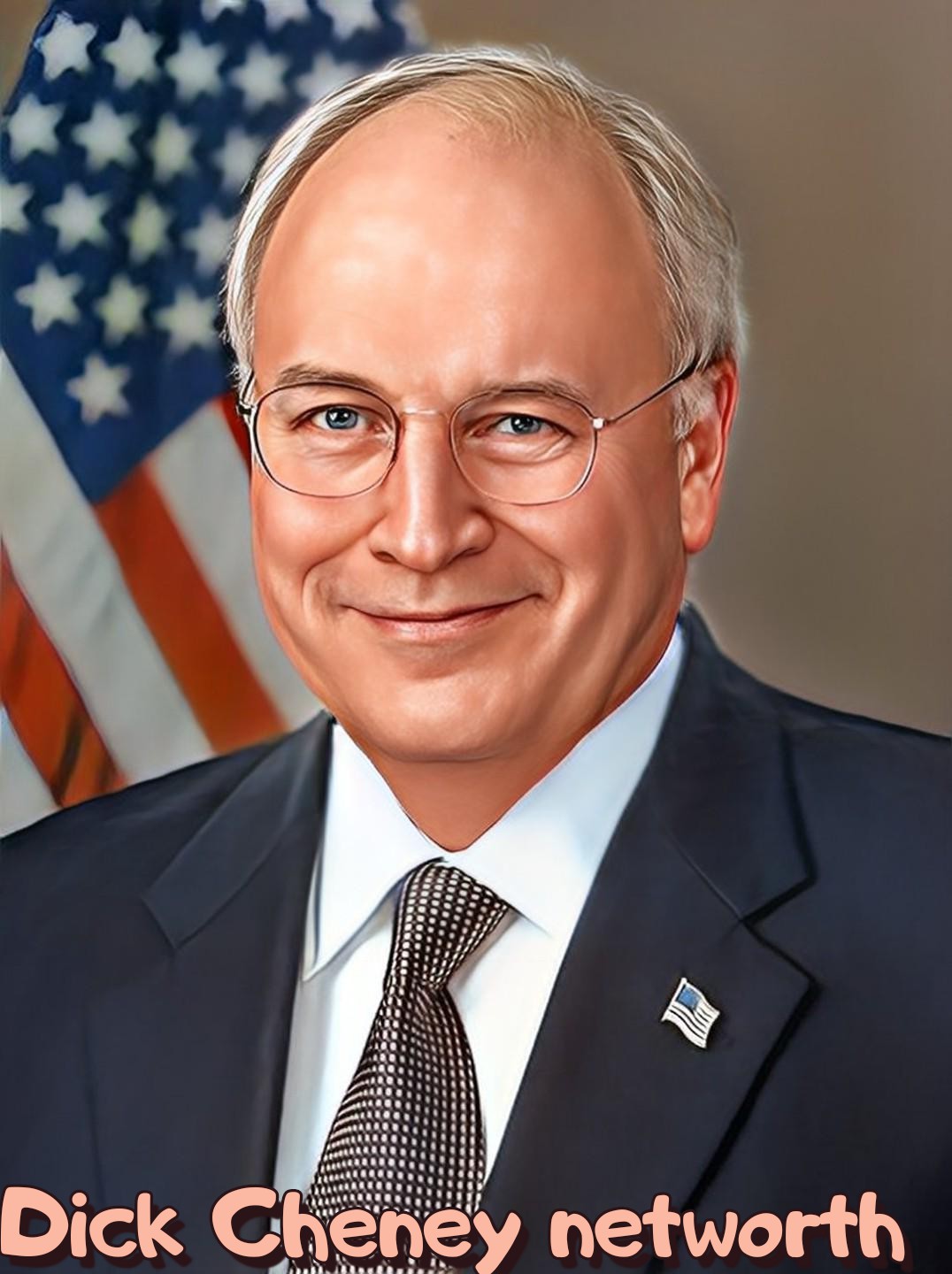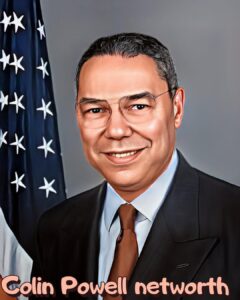| BIO | Details |
|---|---|
| Net Worth | $100 million (2025) |
| Full Name | Richard Bruce Cheney |
| Date of Birth | January 30, 1941 |
| Occupation | Politician, Businessman, Author |
| Nationality | American |
| Spouse | Lynne Cheney |
| Children | Liz Cheney, Mary Cheney |
| Education | University of Wyoming (BA, MA), Yale University (no degree) |
| Political Party | Republican Party |
Table of Contents
ToggleIntroduction: Dick Cheney’s Influence and Wealth in 2025
In 2025, Dick Cheney stands as one of the most prominent and influential figures in modern American politics, renowned for his long and eventful career, which spans politics, business, and policymaking. Known for his role as the 46th Vice President of the United States during the George W. Bush administration, Cheney’s career has been marked by a strong influence on U.S. foreign policy, particularly in shaping decisions on national security and military intervention. However, Cheney’s legacy is not limited to his political achievements. Over the years, he has built an impressive financial empire through his leadership in the corporate world, most notably as the CEO of Halliburton, one of the largest energy service companies globally.
Today, Dick Cheney’s name is associated with power, wealth, and controversy. His business acumen and political prowess have earned him a place among the wealthiest former U.S. politicians. According to Forbes, Dick Cheney’s net worth stands at $100 million as of 2025, making him one of the most financially successful former U.S. Vice Presidents. This article explores Cheney’s sources of income, career milestones, luxury assets, and how his net worth has evolved over the years. It also compares Cheney’s fortune with other prominent figures in the political and business worlds.
Net Worth Overview: A Wealthy Political Figure
As of 2025, Dick Cheney’s net worth is estimated at $100 million. Cheney’s wealth has been accumulated through a variety of revenue streams, including his time in public office, his leadership role at Halliburton, and his continued earnings from public speaking and book deals post-office. Cheney’s influence in the world of business and politics has allowed him to secure lucrative compensation packages, stock options, and investment opportunities, making him one of the wealthiest former U.S. Vice Presidents in history.
Cheney’s financial growth surged particularly during his tenure at Halliburton, where he earned millions in salary, bonuses, and stock options. Even after leaving the company to become Vice President, he continued to receive deferred compensation, contributing further to his wealth. In addition to his corporate earnings, Cheney has made money through his successful memoir and public speaking engagements. His financial standing is a reflection of his diverse career and strategic financial decisions, which have kept him in the upper echelons of U.S. wealth.
Income Sources: How Dick Cheney Amassed His Fortune
How does Dick Cheney make money? Cheney’s financial success comes from a range of income sources, blending public service with corporate leadership and private ventures. His career has spanned over four decades, providing him with multiple opportunities to grow his wealth. Below is an in-depth look at the key sources of his income.
1. Political Career
Cheney’s political career, which spanned from the 1960s to the early 2000s, has contributed a significant portion of his overall wealth. His roles in government provided a steady and lucrative income.
- Vice President of the United States: Cheney served as Vice President from 2001 to 2009 under President George W. Bush. During this time, he earned an annual salary of approximately $230,700. While this may not account for the majority of his fortune, his position gave him significant political clout and opened up avenues for future financial opportunities.
- Secretary of Defense: Between 1989 and 1993, Cheney held the position of Secretary of Defense under President George H. W. Bush, overseeing military operations such as the Gulf War. His salary during this time was estimated to be around $180,000 per year. More importantly, Cheney built connections with defense contractors, laying the groundwork for future corporate success.
- White House Chief of Staff: During the 1970s, Cheney served as Chief of Staff for President Gerald Ford, one of the youngest individuals to hold this position. Although the salary for this role was modest compared to his later earnings, it marked the beginning of Cheney’s rise in U.S. politics, giving him access to influential circles.
2. Corporate Leadership at Halliburton
Dick Cheney’s role as the CEO of Halliburton was the most significant contributor to his wealth. Halliburton is a major player in the global oilfield services industry, and Cheney’s leadership at the company was instrumental in expanding its reach.
- CEO Compensation: During his tenure as CEO from 1995 to 2000, Cheney earned a base salary, along with bonuses and stock options, totaling over $44 million. His compensation package included deferred compensation, which continued even after he left the company to become Vice President, a source of controversy at the time.
- Stock Options and Bonuses: As CEO, Cheney also received substantial stock options, which allowed him to buy Halliburton shares at a lower price. Over time, as the company’s stock value increased, Cheney’s holdings became more valuable, adding significantly to his net worth.
3. Public Speaking and Book Deals
Post-political life has provided Cheney with ample opportunities to capitalize on his public profile. He is a sought-after speaker at various political, corporate, and international events, where his fees range from $50,000 to $200,000 per event.
- Public Speaking: Cheney has delivered speeches at top-tier events, often focusing on national security, politics, and business. These speaking engagements provide a substantial income source for Cheney, and his expertise and political stature continue to make him a popular speaker at high-paying events.
- Books and Memoirs: In 2011, Cheney released his memoir, “In My Time: A Personal and Political Memoir,” which became a bestseller. The memoir provided an inside look at his time in office, including his views on U.S. foreign policy and his role in major political decisions. The book’s commercial success, along with royalties from its sales, has added to Cheney’s financial portfolio. Cheney has also co-authored books with his daughter, Liz Cheney, further increasing his earnings from publishing.
4. Investments and Real Estate
Cheney has diversified his income through smart investments in real estate and stocks. His political and business experience has given him access to high-value investment opportunities, which have paid off over time.
- Real Estate Holdings: Cheney’s most notable property is a sprawling ranch in Jackson Hole, Wyoming, a symbol of his ties to the state where he spent much of his early life. The ranch is valued at several million dollars and represents a significant asset in Cheney’s portfolio. Additionally, he owns a luxury mansion in McLean, Virginia, a prime location near Washington, D.C. The property is located in an affluent neighborhood and is estimated to be worth several million dollars.
- Stock Market Investments: In addition to real estate, Cheney has invested in stocks, particularly in industries related to energy and defense. These investments have provided steady returns and contributed to his overall net worth.
5. Consulting and Board Memberships
Following his departure from public office, Cheney has continued to earn income through consulting roles and serving on the boards of various companies. Although many of these roles are not publicly disclosed, Cheney’s experience in both the political and corporate worlds makes him a valuable asset to companies seeking strategic advice.
- Corporate Board Roles: Serving on corporate boards often comes with generous compensation, including stock options, salaries, and bonuses. Cheney has been affiliated with companies in the defense and energy sectors, industries in which he has considerable expertise.
Career Milestones: Key Moments in Cheney’s Rise to Wealth
Dick Cheney’s career is marked by several pivotal moments that not only solidified his place in American political history but also contributed to his growing wealth. Let’s examine the key milestones in his career that helped him build his fortune.
1. White House Chief of Staff (1975-1977)
Cheney first gained national attention when he became White House Chief of Staff under President Gerald Ford. At the time, he was only 34 years old, making him one of the youngest individuals ever to hold the position. This role provided Cheney with unparalleled access to the highest levels of U.S. government and helped him forge relationships that would later boost his career and financial success.
2. Secretary of Defense (1989-1993)
During the administration of President George H. W. Bush, Cheney served as Secretary of Defense, overseeing major military operations such as Operation Desert Storm and Operation Desert Shield. His leadership during the Gulf War earned him widespread recognition and praise, further bolstering his reputation as a powerful figure in U.S. politics.
As Secretary of Defense, Cheney was responsible for managing the Pentagon’s budget, forming relationships with defense contractors, and overseeing U.S. military actions abroad. His ties to the defense industry, established during this period, would later become an important aspect of his corporate career, particularly during his time at Halliburton.
3. CEO of Halliburton (1995-2000)
Cheney’s time as the CEO of Halliburton is perhaps the most defining chapter in his financial life. Halliburton is one of the largest energy services companies in the world, and under Cheney’s leadership, the company expanded its global operations and increased its profitability. Cheney’s compensation at Halliburton, which included millions in salary, bonuses, and stock options, was a major contributor to his personal wealth.
Even after leaving the company to become Vice President, Cheney continued to receive deferred compensation from Halliburton, which raised ethical questions but contributed significantly to his net worth. His time at Halliburton remains one of the most financially fruitful periods of his career.
4. Vice President of the United States (2001-2009)
Cheney’s role as Vice President during the George W. Bush administration was a culmination of decades of public service and political maneuvering. Cheney was widely regarded as one of the most powerful Vice Presidents in U.S. history, often influencing major decisions, especially in the realm of foreign policy and national security.
During this time, Cheney’s influence over U.S. policy in the Middle East, particularly with the Iraq War, cemented his reputation as a hawkish figure in American politics. While his Vice Presidency did not directly contribute to his financial success, it amplified his public profile and opened doors for lucrative post-political opportunities, such as book deals and speaking engagements.
Luxury Assets: Homes, Cars, and High-End Investments
Despite his relatively low-key public persona, Cheney enjoys a life of luxury, supported by his significant wealth. Over the years, Cheney has invested in high-end real estate, luxury vehicles, and other assets that reflect his financial status.
1. Real Estate
Cheney’s primary residence is his ranch in Jackson Hole, Wyoming, which is valued at several million dollars. The ranch is a sprawling estate that offers Cheney and his family privacy and luxury in one of the most picturesque parts of the United States. Wyoming has always been close to Cheney’s heart, as it is where he began his political career, serving as a Congressman from Wyoming in the 1980s.
In addition to his Wyoming ranch, Cheney owns a mansion in McLean, Virginia, just outside Washington, D.C. The McLean property is located in one of the most affluent neighborhoods in the area and is worth several million dollars.
2. Luxury Vehicles
While Cheney is not known for flaunting his wealth, reports suggest that he owns a collection of luxury vehicles, including Mercedes-Benz and Cadillac models. These high-end cars are emblematic of the lifestyle that Cheney has been able to afford thanks to his financial success.
3. Other High-End Assets
In addition to real estate and vehicles, Cheney has invested in other luxury assets, including art, collectibles, and potentially private planes or yachts. Although these investments are less publicized, they contribute to the overall picture of Cheney’s affluent lifestyle.
Net Worth Over the Years: A Comparative Analysis
Dick Cheney’s net worth has grown significantly over the course of his career, particularly during his time at Halliburton and following his departure from public office. Below is a look at Cheney’s estimated net worth over the years:
- 1995: $10 million (Early days as Halliburton CEO)
- 2000: $20 million (Upon leaving Halliburton to become Vice President)
- 2005: $60 million (Midway through his Vice Presidency)
- 2010: $90 million (After leaving office)
- 2020: $95 million
- 2025: $100 million
As Cheney transitioned from the political arena to the private sector and later into a post-political career, his net worth saw substantial growth. His time at Halliburton, along with continued investments and high-paying speaking engagements, has ensured that Cheney remains financially successful even after leaving the public spotlight.
Comparisons: Dick Cheney vs. Other Political and Business Figures
When compared to other high-profile political figures and business leaders, Cheney’s net worth is impressive, though he is not the wealthiest. Below is a comparison of Cheney’s net worth with other prominent figures:
- George W. Bush: $50 million (Former U.S. President)
- Bill Clinton: $120 million (Former U.S. President)
- Mitt Romney: $300 million (Businessman and U.S. Senator)
- Al Gore: $300 million (Former U.S. Vice President)
- Henry Kissinger: $50 million (Former U.S. Secretary of State)
As seen, Cheney’s wealth places him among the wealthiest former U.S. Vice Presidents, though he trails behind figures like Mitt Romney and Al Gore, who have achieved substantial success in both the private and public sectors.
Predictions and Future Net Worth
Looking ahead, Dick Cheney is expected to maintain or modestly increase his wealth through ongoing investments, public speaking engagements, and book royalties. Although Cheney is no longer actively involved in corporate or political life, his public profile ensures that he remains a sought-after speaker and consultant.
As Cheney ages, it is likely that his focus will shift more toward preserving and managing his existing wealth rather than seeking new financial opportunities. However, given his extensive experience and knowledge in both the public and private sectors, Cheney could potentially increase his net worth through continued strategic investments and high-paying speaking engagements.
Who is Dick Cheney?
Dick Cheney is a former U.S. Vice President, businessman, and influential political figure. Born on January 30, 1941, in Lincoln, Nebraska, Cheney has held several critical positions in U.S. government, including Secretary of Defense and White House Chief of Staff. His leadership during the Gulf War and his tenure as Vice President during the Iraq War have cemented his legacy as one of the most powerful individuals in modern American politics.
Biography: Early Life and Political Beginnings
Dick Cheney was born in Lincoln, Nebraska, and raised in Casper, Wyoming. He attended Yale University, though he left without completing his degree. Later, he earned both a bachelor’s and master’s degree in political science from the University of Wyoming. Cheney began his political career as an intern for Congressman William Steiger before rising to the highest levels of government.
Early Life
Cheney’s early life in Wyoming was shaped by the rugged, independent culture of the American West. His time in Wyoming and his connection to the state played a significant role in shaping his political views and his deep respect for personal responsibility and national defense.
Political Beginnings
In the late 1960s, Cheney worked as a staffer in Washington, D.C., eventually rising through the ranks to serve as White House Chief of Staff under President Gerald Ford. This early exposure to national politics set the stage for Cheney’s long career in public service, including his roles as Secretary of Defense and Vice President.
Conclusion: A Life of Influence and Wealth
Dick Cheney’s career, spanning politics and business, has not only shaped U.S. foreign policy but also built him a substantial personal fortune. From his time at Halliburton to his influential role as Vice President, Cheney has proven adept at navigating both the political and business worlds. As of 2025, Cheney’s net worth is a testament to his enduring influence and success in both arenas.
Cheney remains a significant figure in American politics and business, and his wealth reflects the many opportunities he has capitalized on throughout his career. Although his political career may be behind him, Cheney’s financial legacy is far from over.























+ There are no comments
Add yours